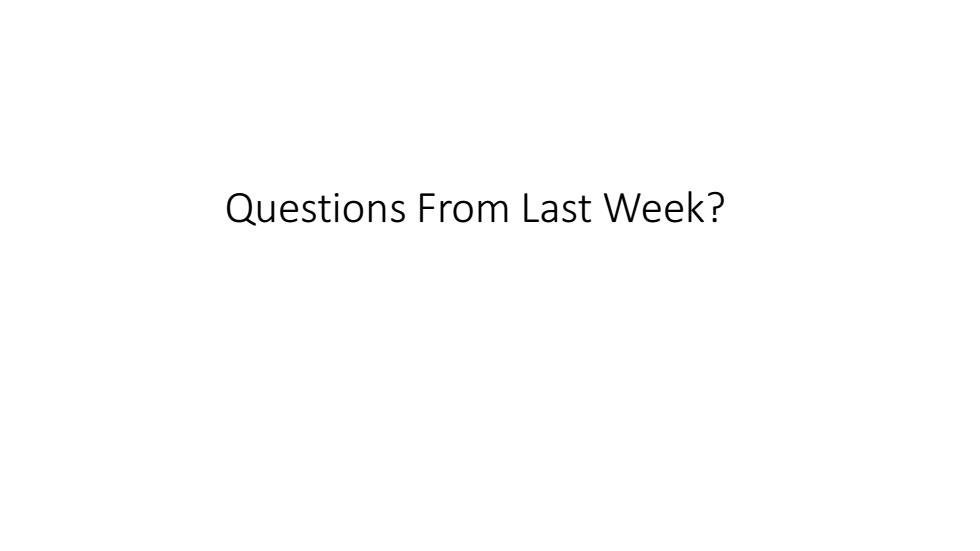
Questions From Last Week?
Questions From Last Week?
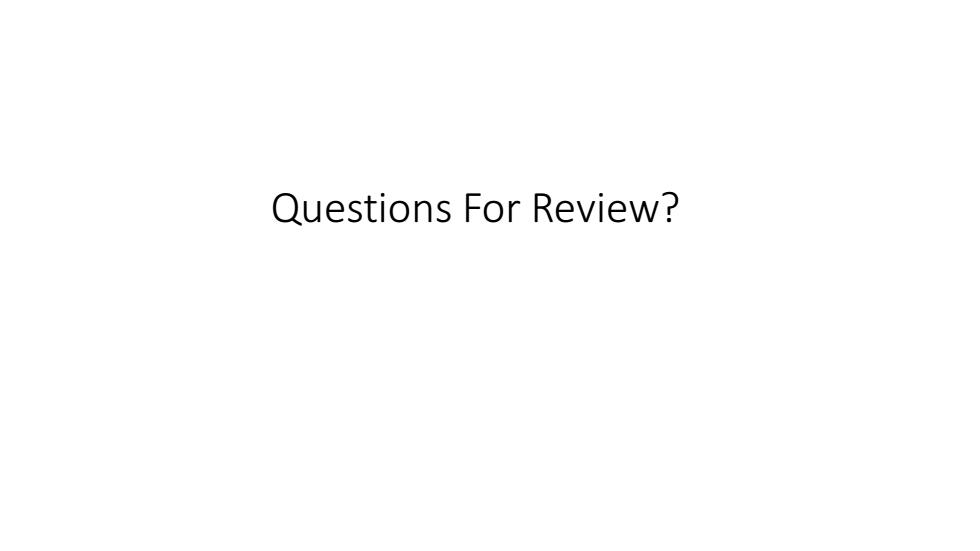
Questions For Review?
Questions For Review?

The Midterm Probably one question with numbers along the same general lines as the railroad/farmer examples Otherwise short explanations of ideas You are responsible for everything in the book so far
The Midterm • Probably one question with numbers along the same general lines as the railroad/farmer examples • Otherwise short explanations of ideas • You are responsible for everything in the book so far
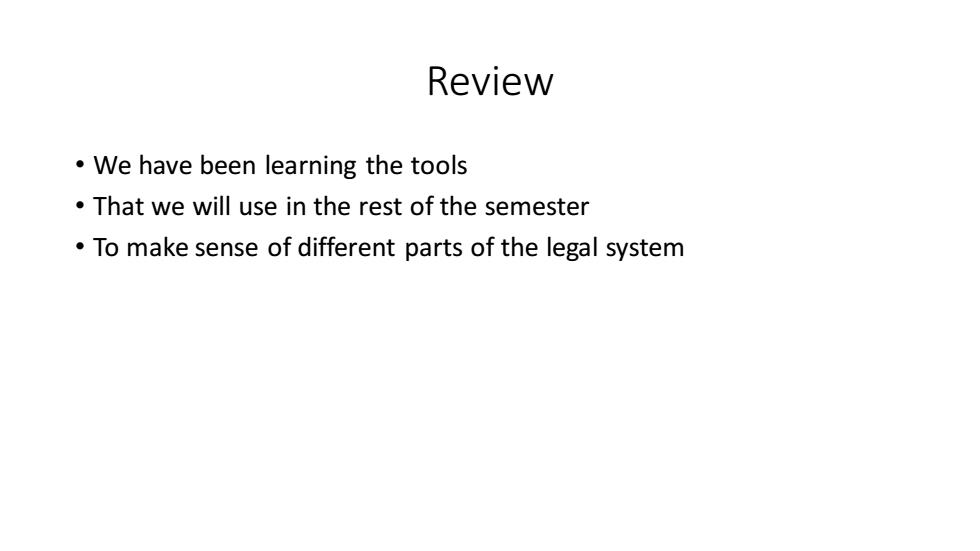
Review We have been learning the tools That we will use in the rest of the semester To make sense of different parts of the legal system
Review • We have been learning the tools • That we will use in the rest of the semester • To make sense of different parts of the legal system
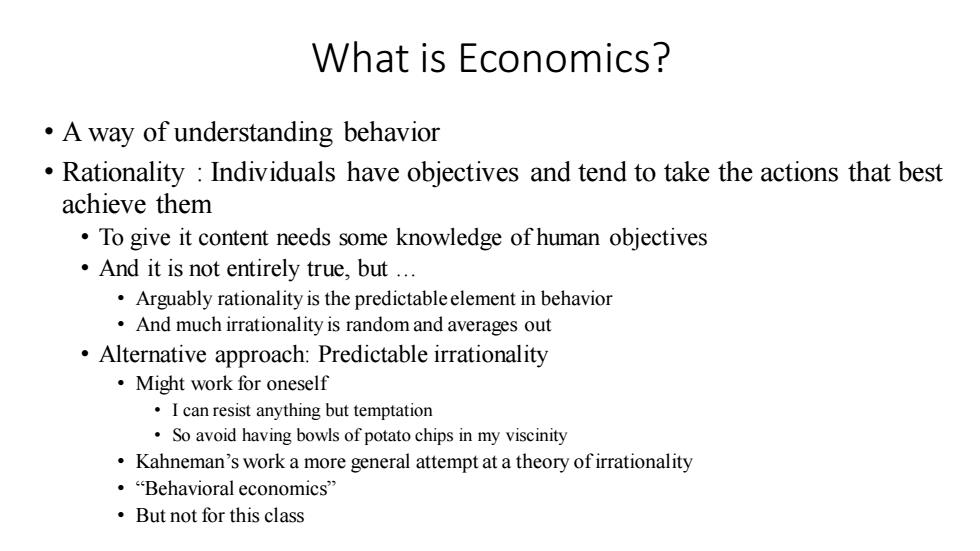
What is Economics? A way of understanding behavior Rationality Individuals have objectives and tend to take the actions that best achieve them To give it content needs some knowledge of human objectives And it is not entirely true,but... Arguably rationality is the predictableelement in behavior And much irrationality is random and averages out Alternative approach:Predictable irrationality Might work for oneself I can resist anything but temptation So avoid having bowls of potato chips in my viscinity Kahneman's work a more general attempt at a theory of irrationality ·Behavioral economics'” ·But not for this class
What is Economics? • A way of understanding behavior • Rationality : Individuals have objectives and tend to take the actions that best achieve them • To give it content needs some knowledge of human objectives • And it is not entirely true, but … • Arguably rationality is the predictable element in behavior • And much irrationality is random and averages out • Alternative approach: Predictable irrationality • Might work for oneself • I can resist anything but temptation • So avoid having bowls of potato chips in my viscinity • Kahneman’s work a more general attempt at a theory of irrationality • “Behavioral economics” • But not for this class

Application of Economics to Law How will rational individuals act in response to legal rules? Provides a way of evaluating,hence designing,rules Possibly a way of understanding the rules that exist If they were designed or evolved to achieve some purpose ·Economic efficiency ·Putting content in“size of the pie?” The degree to which everyone gets what he wants To add everyone up,we need some way of doing interpersonal comparisons By willingness to pay-dollars not utiles One reason a utilitarian might not see efficiency as the objective And not everyone is even a utilitarian The Posner Conjecture:Common law is as if designed to maximize efficiency Alternatively,if efficiency is what you want,what legal rules would get it?
Application of Economics to Law • How will rational individuals act in response to legal rules? • Provides a way of evaluating, hence designing, rules • Possibly a way of understanding the rules that exist • If they were designed or evolved to achieve some purpose • Economic efficiency • Putting content in “size of the pie” • The degree to which everyone gets what he wants • To add everyone up, we need some way of doing interpersonal comparisons • By willingness to pay–dollars not utiles • One reason a utilitarian might not see efficiency as the objective • And not everyone is even a utilitarian • The Posner Conjecture: Common law is as if designed to maximize efficiency • Alternatively, if efficiency is what you want, what legal rules would get it?
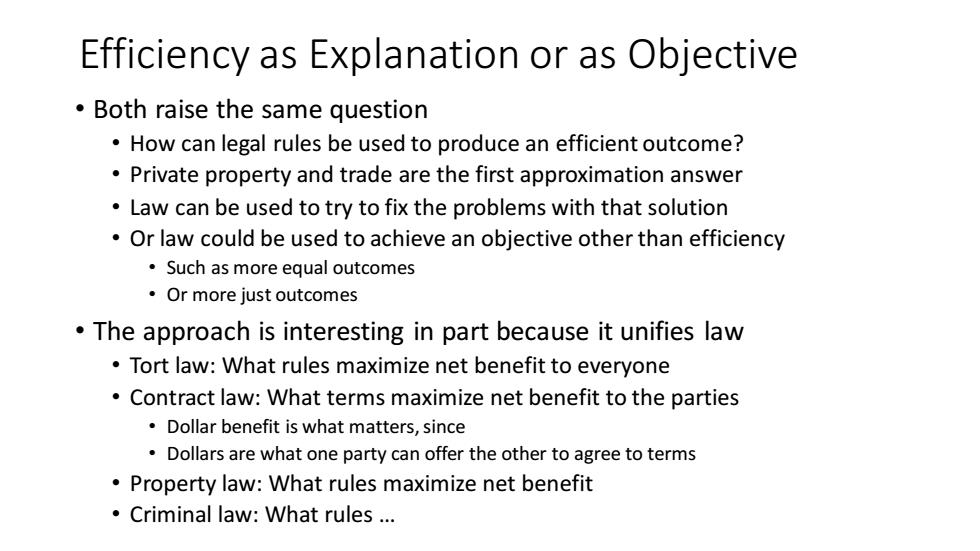
Efficiency as Explanation or as Objective Both raise the same question How can legal rules be used to produce an efficient outcome? Private property and trade are the first approximation answer Law can be used to try to fix the problems with that solution Or law could be used to achieve an objective other than efficiency Such as more equal outcomes ·Or more just outcomes The approach is interesting in part because it unifies law Tort law:What rules maximize net benefit to everyone Contract law:What terms maximize net benefit to the parties Dollar benefit is what matters,since Dollars are what one party can offer the other to agree to terms Property law:What rules maximize net benefit Criminal law:What rules
Efficiency as Explanation or as Objective • Both raise the same question • How can legal rules be used to produce an efficient outcome? • Private property and trade are the first approximation answer • Law can be used to try to fix the problems with that solution • Or law could be used to achieve an objective other than efficiency • Such as more equal outcomes • Or more just outcomes • The approach is interesting in part because it unifies law • Tort law: What rules maximize net benefit to everyone • Contract law: What terms maximize net benefit to the parties • Dollar benefit is what matters, since • Dollars are what one party can offer the other to agree to terms • Property law: What rules maximize net benefit • Criminal law: What rules …
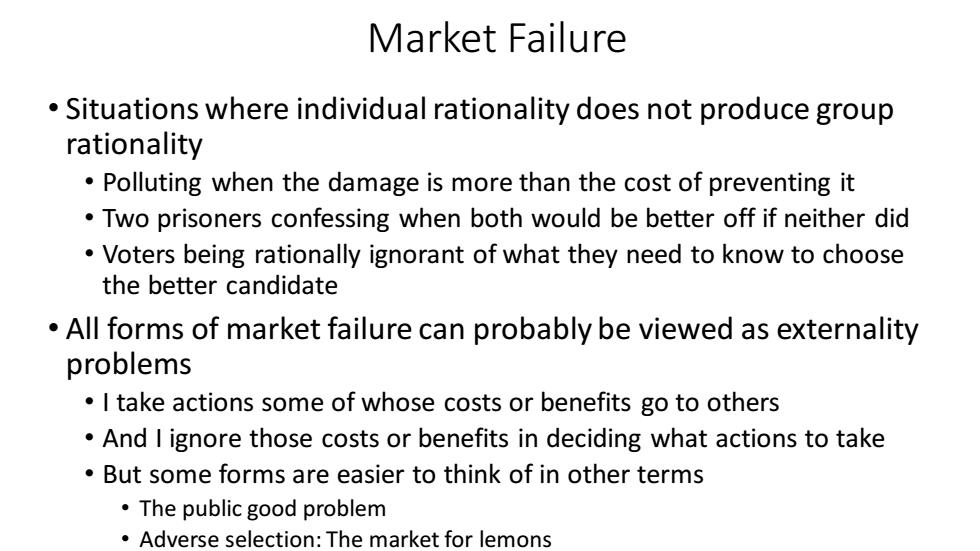
Market Failure Situations where individual rationality does not produce group rationality Polluting when the damage is more than the cost of preventing it Two prisoners confessing when both would be better off if neither did Voters being rationally ignorant of what they need to know to choose the better candidate All forms of market failure can probably be viewed as externality problems I take actions some of whose costs or benefits go to others And I ignore those costs or benefits in deciding what actions to take But some forms are easier to think of in other terms The public good problem Adverse selection:The market for lemons
Market Failure • Situations where individual rationality does not produce group rationality • Polluting when the damage is more than the cost of preventing it • Two prisoners confessing when both would be better off if neither did • Voters being rationally ignorant of what they need to know to choose the better candidate • All forms of market failure can probably be viewed as externality problems • I take actions some of whose costs or benefits go to others • And I ignore those costs or benefits in deciding what actions to take • But some forms are easier to think of in other terms • The public good problem • Adverse selection: The market for lemons

Rent Seeking and Pecuniary Externalities Rent seeking is a particular externality problem I can bear a cost to transfer from you to me The transfer neither increases nor decreases efficiency,but The cost of doing it decreases efficiency Why theft is a bad thing A pecuniary externality is an externality that does not cause inefficient actions A's action causes a transfer from B to C C's benefit just balances B's loss So A's net benefit is the same as the net benefit for A+B+C So A has the right incentive If the transfer was from B to A,A would have the wrong incentive Getting us back to rent seeking
Rent Seeking and Pecuniary Externalities • Rent seeking is a particular externality problem • I can bear a cost to transfer from you to me • The transfer neither increases nor decreases efficiency, but • The cost of doing it decreases efficiency • Why theft is a bad thing • A pecuniary externality is an externality that does not cause inefficient actions • A’s action causes a transfer from B to C • C’s benefit just balances B’s loss • So A’s net benefit is the same as the net benefit for A+B+C • So A has the right incentive • If the transfer was from B to A, A would have the wrong incentive • Getting us back to rent seeking
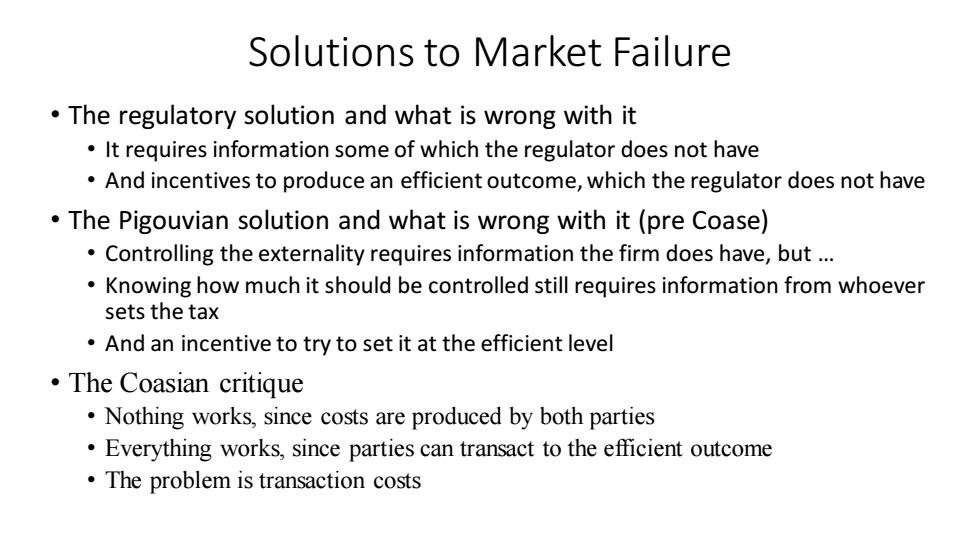
Solutions to Market Failure The regulatory solution and what is wrong with it It requires information some of which the regulator does not have And incentives to produce an efficient outcome,which the regulator does not have The Pigouvian solution and what is wrong with it(pre Coase) Controlling the externality requires information the firm does have,but... Knowing how much it should be controlled still requires information from whoever sets the tax And an incentive to try to set it at the efficient level ·The Coasian critique Nothing works,since costs are produced by both parties Everything works,since parties can transact to the efficient outcome The problem is transaction costs
Solutions to Market Failure • The regulatory solution and what is wrong with it • It requires information some of which the regulator does not have • And incentives to produce an efficient outcome, which the regulator does not have • The Pigouvian solution and what is wrong with it (pre Coase) • Controlling the externality requires information the firm does have, but … • Knowing how much it should be controlled still requires information from whoever sets the tax • And an incentive to try to set it at the efficient level • The Coasian critique • Nothing works, since costs are produced by both parties • Everything works, since parties can transact to the efficient outcome • The problem is transaction costs